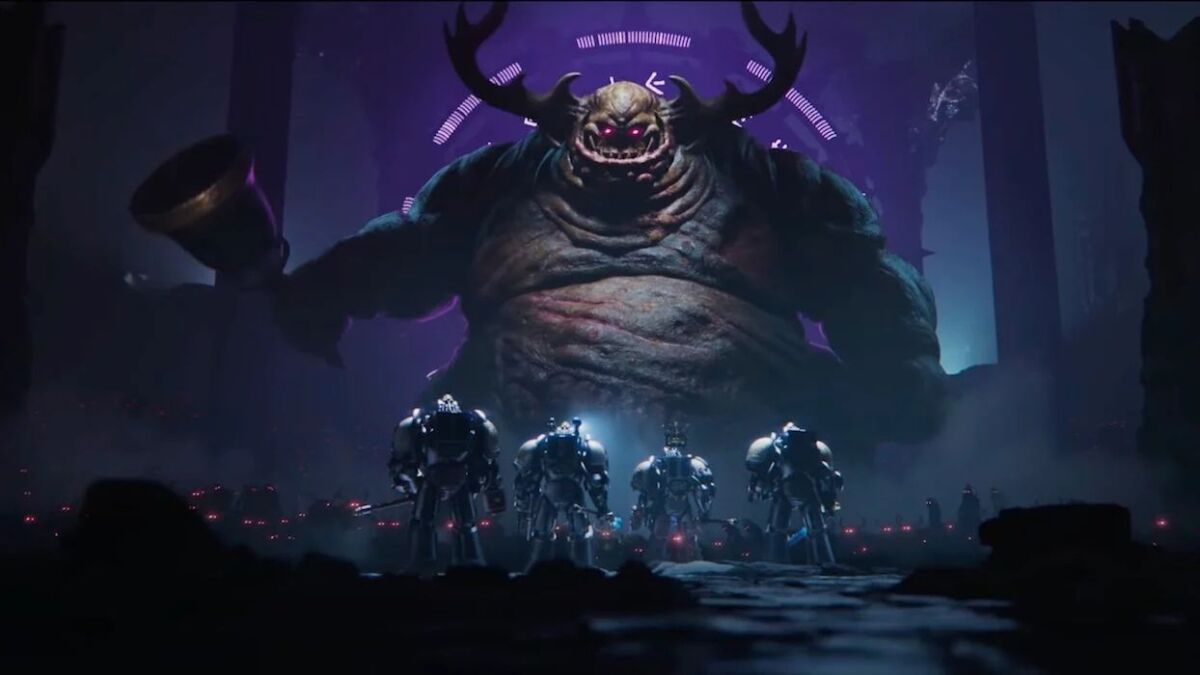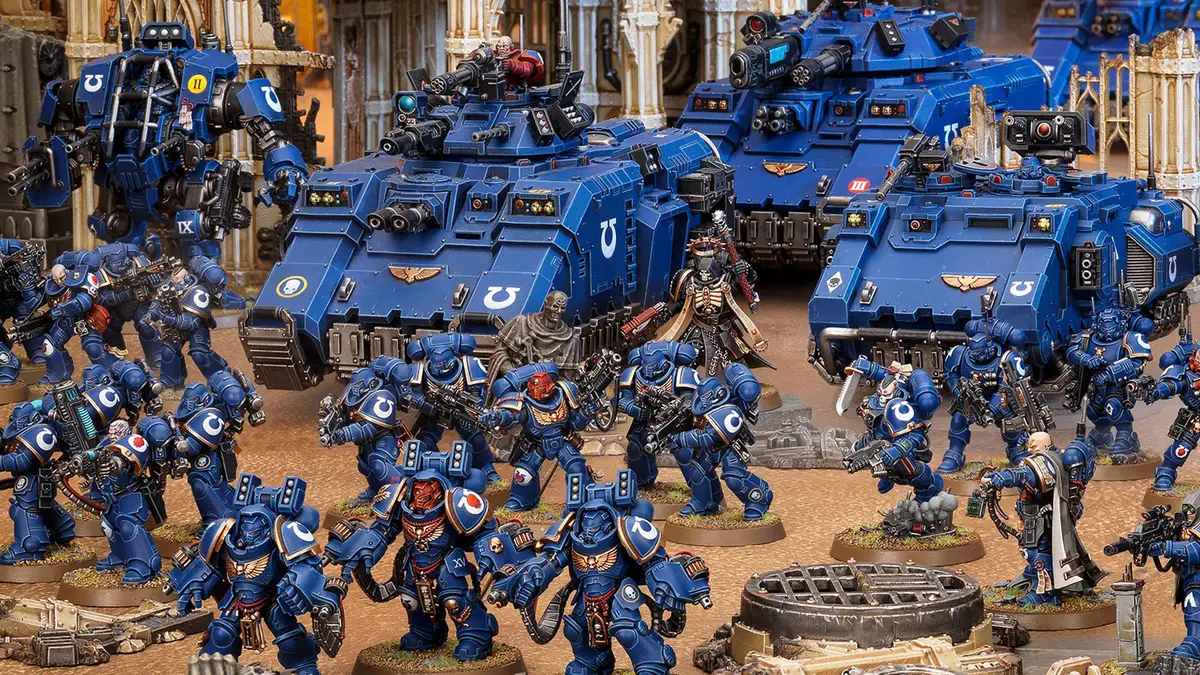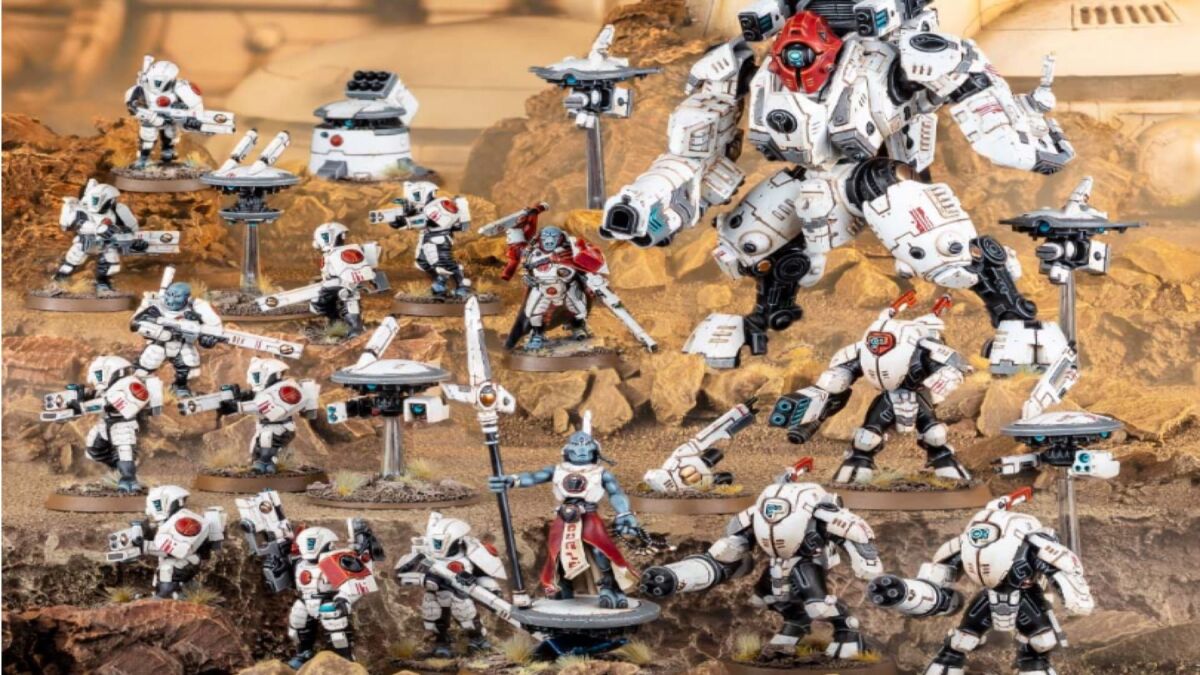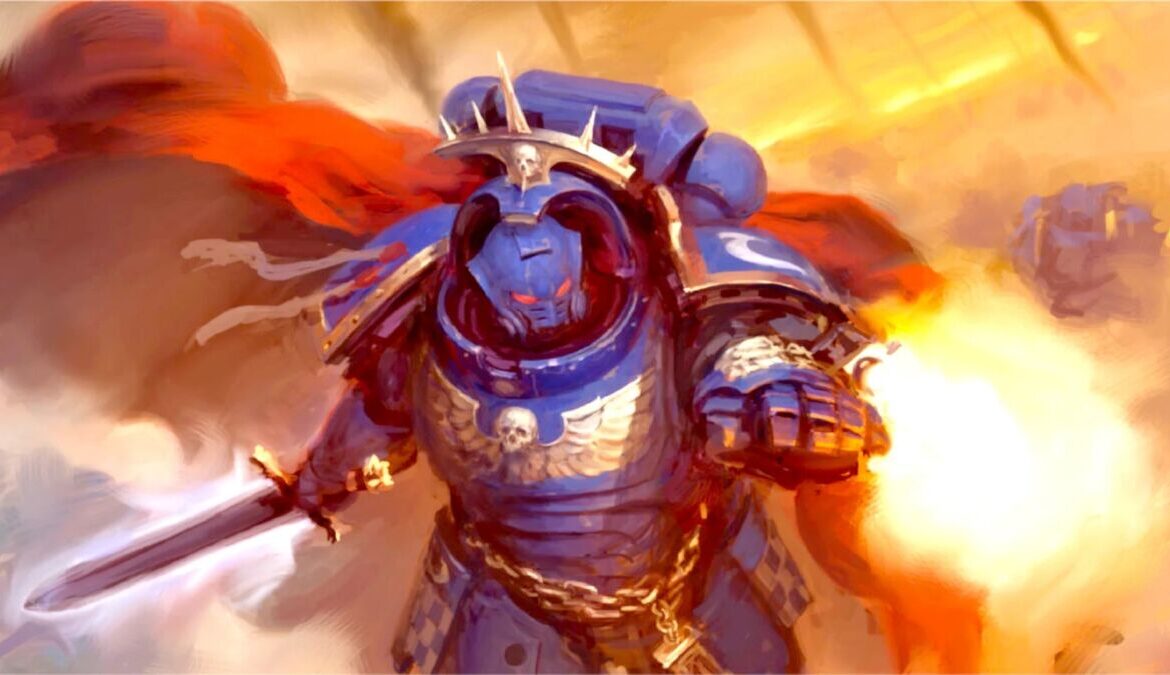Warhammer 40,000 – grim, dark, fiddly, confusing, time consuming, addictive. For the past 40 years, this peculiar yet compelling game has been growing into one of the biggest tabletop gaming franchises in the world, and that growth has been paralleled by increasingly complex rules, wider ranges of models, numerous spin-offs and convoluted lore. At the height of its popularity, it’s difficult for newcomers to know where to begin. That’s where we come in, with this handy guide for anyone thinking of diving headfirst into the grim dark future of the 41st Millennium.
Speaking personally, I gave it a try when I was around 11 years old, ping ponging between different armies and struggling to commit enough time and attention to finish painting anything or properly learn the rules (or convince my parents to shell out for all the books and paraphernalia required to do so). I had another dalliance when I was around 17 but more on the Fantasy side, and broadly the same thing happened again.
It wasn’t until around 2017 that I re-engaged with the hobby, at which point some key things had changed. Chief among those was that I had my own disposable income, so suddenly I could choose my own level of commitment. The second thing was that YouTube was now awash with battle reports and painting tutorials, meaning that it was far easier to seek out guidance on how to engage with the hobby. Lastly, I was old enough to understand that I needed to put the hours in to get the most out of it. All of a sudden, I’d found the groove, and when lockdown hit in 2020, it was an absolute godsend.
I still feel very much like a beginner – I’ve never played competitively, nor painted anything well enough to feel comfortable showing it off and I still need to stop every two minutes during a game to check the rules. This is why it’s important to understand what you’re getting into if you do want to get involved with the hobby. What follows is a (very) high level intro to what Warhammer 40k is, what you really need to know to get into it, and where to begin.
The Lore

40k has been around since the 1980s, and in the ensuing years the narrative has evolved and gone through countless revisions and retcons, and it continues to evolve and mutate. It would take up far too much of this article to get into the weeds of it, so I thought it would be easiest to break it down into a basic timeline of important events, but first: the setting.
40k is set in the 41st millennium in accordance with our calendar. At this point, most of the galaxy has been charted, all manner of aliens exist and everyone is at war with everyone else, often including themselves. Humanity is sprawling, spanning countless planets, and not in a good way whatsoever. One important thing to remember in the 40k universe – there are no good guys, and the Imperium of Mankind aren’t even the closest to being the good guys. The other thing to understand is The Warp. The Warp is a parallel dimension made up of raw psychic energy. You can draw from it to create and harness magical powers, and you can move through it in order to travel across vast distances of space in virtually no time at all. The problem is that within it lies a crucible of madness – every emotion, thought and belief is made manifest in the warp, and through that arrived the Chaos Gods: Nurgle – god of disease and decay, Khorne – god of war and blood, Tzeentch – god of change and trickery and Slaanesh – god of excess and indulgence.
The Chaos Gods are pretty much eternal, and arguably the main villains of the franchise, but there’s plenty more going on besides them. Below is a rough timeline of the 40k universe by key events. If you want a more comprehensive version, you can find one here.
- Universe created, Star Gods float around feeding on stellar energy, not much going on
- Old Ones are first sentient race, they are all but wiped out in a huge war with another race, Warp opens, shenanigans
- Humans turn up, make massive tech advances, go too far, enter a new dark age, everything sucks
- Space Elves party too hard and accidentally create a Chaos God (Slaanesh) who eats most of them and rips a huge hole in spacetime (Eye of Terror)
- Emperor of Mankind arrives, briefly fixes everything, clones himself to create a series of ‘Primarch’ sons to lead his armies (Space Marines), half of them fall to Chaos and betray him, he winds up 99% dead in a city-sized life-support system that runs on souls, everything sucks again
- Traitor legions re-emerge as Chaos Space Marines (of various flavours), the race that killed off the Old Ones reawaken as the Necrons, everyone starts waging war on everyone else
That’s where we find ourselves in the 41st Millennium. There is a lot going on at all corners of the galaxy at this stage, but the period before that, the civil war known as the ‘Horus Heresy’ is probably the most pivotal event in the narrative and there are dozens of books about the various players in that game, so if you really want to dig in deep, it’s a good place to start. The sprawling series of Warhammer novels known as the Black Library is a fantastic resource, and they have a great guide on how to get started if you’re minded to really dig into all the fluff.
Pick an Army

The above overview should give you a sense of the key players in the 40k universe, so when you decide you want to muck in, you have to pick a faction.
From the top, my advice would be to think about what really appeals to you about the narrative/game, and use that as a basis to select which army you want to start with. If you’re playing to win, pick an army that hits hard and is easy to grasp. If you’re playing to learn how to strategise, pick an army which is harder to master but rewards patience and consideration. If there’s part of the lore you really love, cast all that aside and just choose the army most directly aligned to that storyline. The aim here is to have fun, after all. One very important thing to remember, though – don’t try and pick an army based on it being the heroic or righteous figure in the story, as, from top to bottom, they are all terrible.
Once again, I won’t include a wealth of detail about all the armies here, You can learn about them on the Warhammer website or in handy guides like this one, and when you’re ready, check out the index cards to see how they operate on the table. Instead, let’s just give you some armies to look at, depending on the way you want to play:
- Close-combat specialists: Orks, World Eaters, Space Wolves, Dhrukari
- Shooting/ranged specialists: Tau Empire, Leagues of Votann, Imperial Guard, Adeptus Mechanicus
- Durable defensive specialists: Necrons, Dark Angels, Death Guard
- Easy to use and do a bit of everything: Space Marines, Chaos Space Marines, Tyranids, Black Templars
- Sneaky, unpredictable specialists: Genestealer Cults, Harlequins, Chaos Daemons
- Adaptable, technical specialists: Aeldari, Adeptus Sororitas, Thousand Sons, Grey Knights, Adeptus Custodes, Blood Angels
- Big stompy robots: Imperial Knights, Chaos Knights
Remember, there are no wrong answers here, as every army has its own appeal and tactical upside. Whichever one you opt for, they’ve got something to offer.
Give It A Go

This is the one that I think is most crucial. You can immerse yourself in the history, lore and content of Warhammer, but if you drop a bunch of money on some kits, build them up, paint them, play a game on the table and at the end of all that find you haven’t enjoyed any part of it, it’ll be hard not to feel embittered.
As a kid, I struggled with this. I was so enchanted by the artwork and images of the painted models and I was impatient to get there but I didn’t really know what I was working towards. With that in mind, my advice is to try it first to get a flavour of how the game actually works in practice.
Thankfully, this is relatively easy to do. Every Warhammer shop or independent gaming club will offer some kind of ‘taster session’. You don’t need to bring anything of your own, something will be there teaching you (or you and a friend) how everything works. At the entry level, trust me, you want that. Veteran players (be they GW employees or otherwise) will be able to cut to the chase and show you what’s really important about the game. More importantly, though, you’ll get a feel for how much you like it.
Likewise, I would say that if you’re completely fresh to it, don’t invest in an army straight away. Pick up a beginner kit. Games Workshop sells these and they’re excellent – they come with a handful of models, paints, brushes and some useful written guidance. The models might not be from the army you want to collect but they will be on the more straightforward side in terms of construction and painting, which is more important at first pass. You may well pick an army that’s a little bit more challenging to paint up, so if you start there it might sour your experience of painting and make it harder to commit. Sadly some of the coolest-looking models in the game are also the trickiest to paint. One of my armies, the Thousand Sons, are perhaps the most infamous example of this.
Start Collecting

So, you’ve engaged with the lore, chosen your army and tried the hobby out to see if it gels; what next? Well, time to pull out your wallet. Happily, although still costly, Warhammer 40k doesn’t have quite such a financial barrier to entry as it once did.
This is in part thanks to the new Combat Patrol boxes. Each one contains a small force which can be played on the table straight away using a free, sort of scaled-down ruleset which is available for free via the Warhammer website/mobile app.
Pick one of these up, get the models built and painted and you’re pretty much good to go. Once you’re a bit more seasoned, it provides a good baseline for expanding, perhaps into some of the bigger, more elaborate models, but no matter where you head next you know you have a viable coherent force to play games with.
To War!

The final step is, of course, playing the actual game. Now, this is weirdly the part that’s most optional. Arguably, you could just delve into the lore and watch battle reports but never fully involve yourself in the game, but many people will stick to collecting and painting without ever actually committing to rolling dice, and there’s certainly nothing wrong with that.
If you do want to play though, you’ll need to find somebody to play against. This could be a friend or relative, and setting up a game at home is dead simple. The rules are free online, and you can use a dining room table and random things from around the house to replicate terrain. It may not be the most exact or immersive way of playing, but it still gives you a chance to see how the game functions and start figuring out the way you enjoy playing.
If you do want something a bit more regulation, your best bet is to find a local gaming club (official Warhammer shops generally don’t offer this, sadly) and book a slot. They’ll have the right sized tables and all the terrain you need. All you need to avail yourself of is a set of dice and a measuring tape. You can also build your own gaming table and terrain at home but, once again, that’s a big commitment.
If you don’t have anyone to play against, or simply want to leverage the hobby to meet new people, pretty much any populous area is bound to have some kind of wargaming guild or society. You can check Facebook, Reddit or Discord to find out or just pop down to your local gaming club and ask around. Warhammer players are friendly, accommodating and very welcoming to new players, and of all the things to say in favour of the hobby, the strength of the community is the most significant.
READ NEXT: Total War: Warhammer 3 – How to Earn Meat
Some of the coverage you find on Cultured Vultures contains affiliate links, which provide us with small commissions based on purchases made from visiting our site. We cover gaming news, movie reviews, wrestling and much more.



